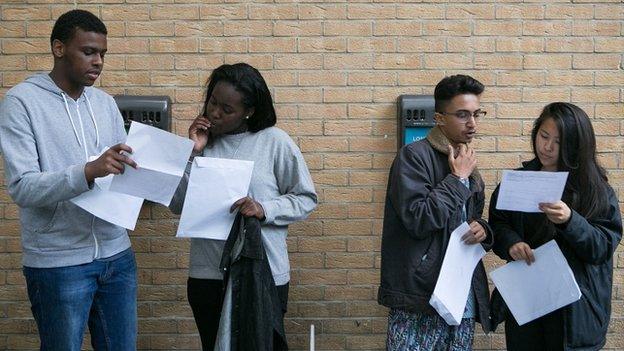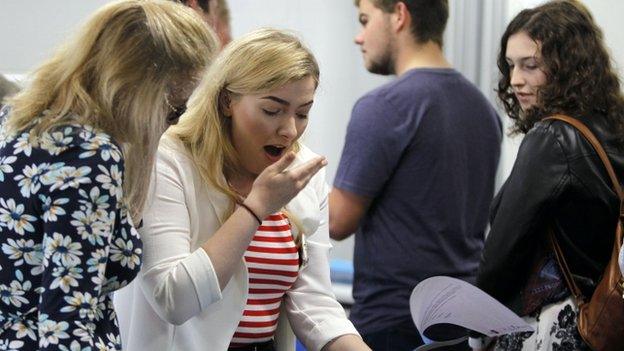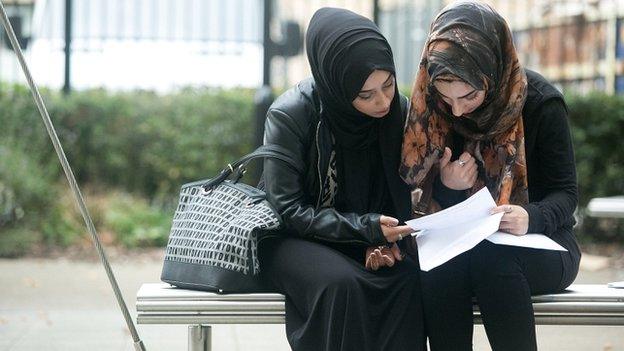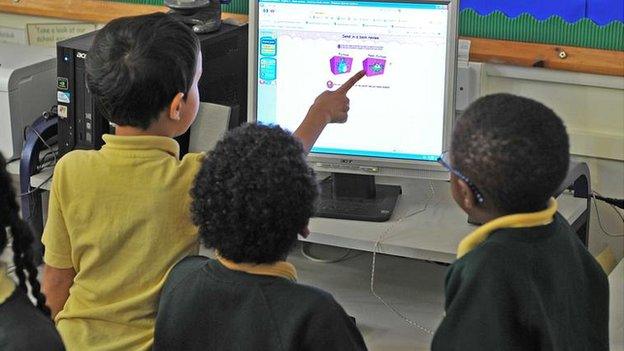What are the lessons of this year's A-levels?
- Published

Students in London finding out their A-level results
A-level results have arrived, distributing good news and disappointment.
And it's important to remember that behind all the statistics about hundreds of thousands of grades are personal stories of hopes and fears.
But it's also an annual ritual to use A-level results as a way of taking stock of the education system.
This year it will be hard to throw accusations of "grade inflation" or slipping standards because the results are almost exactly the same as last year.
"Stability", this year's watchword from exam board chiefs, is not exactly going to set pulses racing.
But it will be what exam regulators intended, promoting reassurance and continuity rather than volatility and turbulence for the "gold standard" qualification.
Changes ahead
Head teachers, including those in independent schools, have often been vociferous in their doubts about the reliability of marking and the exam system.
And they have also complained about how an exam system which now promotes stability in results is reconciled with pressures on schools to keep getting higher grades, or else be accused of "coasting".
But this year could also be something of a calm before the storm.
The results announced this week are for exams taken under the old system of A-levels.
The plans for tougher, non-modular exams and the decoupling of A and AS-levels, announced by former education secretary Michael Gove, have still to be introduced.
In many ways these results have been the closing act of the old exam system.

Behind the statistics are lots of personal stories
In a couple of years, when the redesigned A-levels are being taken for the first time, outcomes could be less predictable.
And when results seem so similar it's easy to miss the big underlying patterns.
More students
The number of school leavers heading to university continues to rise relentlessly.
Regardless of government, economic cycles, fees and exam results, year after year, decade after decade, more young people sign up for undergraduate courses.
There will be more people starting university this autumn than were getting five good GCSEs a couple of decades ago. It's a major social change.
In 1980, about 68,000 people were getting undergraduate degrees, by 2000 that had risen to 243,000.
On Thursday morning, even before clearing had begun and second choices had been weighed up, there were 409,000 places confirmed.
Upward curve
The removal of a limit on university numbers introduced this year is budgeted on the assumption that there is not much extra demand left in the system, perhaps another 30,000 or so.

Female students have continued to be more likely to get university places
But this has been a remarkably resilient, aspirational, upward curve.
It's also worth noting that despite the irresistible rise in young full-time students, the number of part-time and mature students has never really recovered from the hike in tuition fees, despite repeated warnings about the skills gap and the need for re-training.
The gender divide is another pattern that seems to deepen.
Last year saw the widest gap, with 58,000 more women getting university places than men.
And the first admissions figures from this year show an even wider gap than at the same stage last year.
The headline UK figure for top A* and A grades fell marginally this year to 25.9%.
But in the south east of England the proportion was 38.8% and in London it was 36.2%.
In Wales, the figure is 23.1% and in Northern Ireland 29.3%.
Exam system devolution
This year's A-level figures show maths, English and biology to be the most popular subjects, with maths having steadily increased in recent years.
But there is an even longer-term trend in the decline of French.
When the gender divide and national differences overlap, it means that in Wales there were only 128 boys taking A-level French this year.
The changes about to be introduced for A-levels in England will also accelerate devolution within the exam system.
England, Wales and Northern Ireland might continue to call their exams A-levels, but they are going to be increasingly different.
How long will the grades be published together as though they were equivalents?
But for the students and their families getting results there will be more immediate concerns with celebrations and commiserations.
- Published6 July 2015
